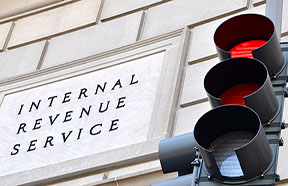

IRS Health Plan Changes for 2020
Those changes include making it easier to get health care and allowing employees to make mid-year changes to their FSAs if their employers allow it.
The threat of COVID-19 has made people even more aware of how important it is to have good health care coverage. As a result, the Internal Revenue Service (IRS) issued several rules making it easier for individuals to get health care this year. However, implementation of the majority of the rules depends on getting buy-in from employers.
The rules affect 2020 employer-provided health insurance, Flexible Spending Arrangements (FSA) and High-Deductible Health Plans (HDHP).
Employer-sponsored Health Insurance
Some employees realize the health coverage they signed up for no longer meets their medical needs, while others who declined coverage wish they hadn't. Usually, the only time employees can sign up for employer-sponsored health insurance is during the plan's renewal period or when they have a qualifying "life event" such as marriage or the birth of a child.
For this year only, IRS Notice 2020-29 allows employers to modify their health benefit plans so employees can make certain mid-year changes to their 2020 health insurance.
If employers choose, they can amend their health plan to allow employees to do one or more of the following:
- Sign-up for health insurance for 2020 even if they initially declined coverage.
- Sign-up for a different health plan.
- Allow an employee to revoke their existing coverage if they promise in writing to enroll in other coverage not sponsored by the employer.
Employers also can limit health insurance changes to only those changes that would improve an employee’s coverage, such as switching from a low-option plan to a high-option plan.
FSA
An employer can set up an FSA to allow employees to contribute pre-tax money to pay for qualified medical expenses. A dependent care FSA can be used to pay for childcare or adult-care expenses.
This year the IRS is also allowing employees to make mid-year changes to their health and dependent FSAs — if their employer modifies the company's FSA plan.
If their employer approves the modification, employees can:
- Sign up to contribute to a health or dependent care FSA for 2020
- Decide not to contribute to an FSA
- Increase or decrease their 2020 contribution amount.
Employees generally have to use all of the savings in the year they put it in their account or they will lose it. An employer can choose to allow workers to carry-over to the next year up to $500 of unused contributions.
Effective for plan years starting on and after Jan. 1, 2020, Notice 2020-33 increases the $500 carryover limit for health FSAs to 20 percent of the annual salary reduction contribution limit. This means that the limit is increasing to $550 for 2020. The carryover amount will be adjusted for inflation going forward.
This change doesn't apply to amounts carried over from 2019 to 2020.
HDHP
An HDHP insurance plan has a lower monthly premium than traditional health insurance, but requires members to pay more of their health care bill before the insurance company starts to pay its share. An HDHP usually is combined with a health savings account (HSA), which allows an HDHP member to save money tax free in order to pay qualified medical, pharmacy, dental and vision expenses.
In Notice 2020-15 the IRS said that health plans that otherwise qualify as HDHPs will not lose that status merely because they cover the cost of testing for or treatment of COVID-19 before plan deductibles have been met. The IRS also noted that, as in the past, any vaccination costs continue to count as preventive care and can be paid for by an HDHP.
The IRS also expanded the types of testing and treatments permitted without applying usual required HDHP deductibles. The services added include:
- Diagnostic testing for influenza A & B; norovirus and other coronaviruses; respiratory syncytial virus (RSV) and any items or services required to be covered with zero cost sharing.
- Telehealth and other remote care services.
If you decide to make any of these changes for 2020, you should communicate the changes to employees in time to be useful and you must adopt conforming plan amendments no later than Dec. 31, 2021.
Non-Calendar Year Plans and Plans with Grace Periods
For 2020 only, Notice 2020-29 also includes special relief for plans under which the deadline to incur expenses ends before Dec. 31, 2020. Under this relief, a plan may extend the deadline to incur expenses up to Dec. 31, 2020.
2021 HSA and High Deductible Limits and Maximums
Short on Funds? When Furloughs Make Sense
The Good News About Retirement Savings in Light of the Stock Market Downtown
IRS Health Plan Changes for 2020
Company Policies Must Now Address LGBTQ Rights in the Workplace
The information presented and conclusions within are based upon our best judgment and analysis. It is not guaranteed information and does not necessarily reflect all available data. Web addresses are current at time of publication but subject to change. SmartsPro Marketing and The Insurance 411 do not engage in the solicitation, sale or management of securities or investments, nor does it make any recommendations on securities or investments. This material may not be quoted or reproduced in any form without publisher's permission. All rights reserved. ©2020 The Insurance 411. http://theinsurance411.com Tel. 877-762-7877.